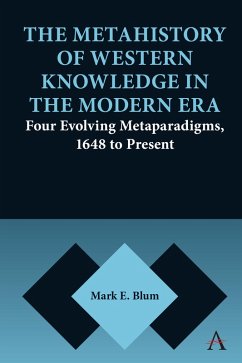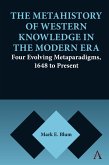Mark E. Blum
The Metahistory of Western Knowledge in the Modern Era (eBook, PDF)
Four Evolving Metaparadigms, 1648 to Present
33,95 €
33,95 €
inkl. MwSt.
Sofort per Download lieferbar

17 °P sammeln
33,95 €
Als Download kaufen

33,95 €
inkl. MwSt.
Sofort per Download lieferbar

17 °P sammeln
Jetzt verschenken
Alle Infos zum eBook verschenken
33,95 €
inkl. MwSt.
Sofort per Download lieferbar
Alle Infos zum eBook verschenken

17 °P sammeln
Mark E. Blum
The Metahistory of Western Knowledge in the Modern Era (eBook, PDF)
Four Evolving Metaparadigms, 1648 to Present
- Format: PDF
- Merkliste
- Auf die Merkliste
- Bewerten Bewerten
- Teilen
- Produkt teilen
- Produkterinnerung
- Produkterinnerung

Bitte loggen Sie sich zunächst in Ihr Kundenkonto ein oder registrieren Sie sich bei
bücher.de, um das eBook-Abo tolino select nutzen zu können.
Hier können Sie sich einloggen
Hier können Sie sich einloggen
Sie sind bereits eingeloggt. Klicken Sie auf 2. tolino select Abo, um fortzufahren.

Bitte loggen Sie sich zunächst in Ihr Kundenkonto ein oder registrieren Sie sich bei bücher.de, um das eBook-Abo tolino select nutzen zu können.
The book is a study of the evolving history of knowledge in the arts and sciences in the modern era -from 1648 through the present. Modernism is treated as an epoch with evolving disciplines whose articulated problems of a time and the inquiry methods to address them develop in a coordinated manner, given a mutual awareness.
- Geräte: PC
- mit Kopierschutz
- eBook Hilfe
- Größe: 14.87MB
Andere Kunden interessierten sich auch für
![The Metahistory of Western Knowledge in the Modern Era (eBook, ePUB) The Metahistory of Western Knowledge in the Modern Era (eBook, ePUB)]() Mark E. BlumThe Metahistory of Western Knowledge in the Modern Era (eBook, ePUB)32,95 €
Mark E. BlumThe Metahistory of Western Knowledge in the Modern Era (eBook, ePUB)32,95 €![Historical Dynamism and the Power of Song and Dance in the Preservation of Indigenous Knowledge and Cultural Heritage among the Pre-Colonial Gusii of South Western Kenya (eBook, PDF) Historical Dynamism and the Power of Song and Dance in the Preservation of Indigenous Knowledge and Cultural Heritage among the Pre-Colonial Gusii of South Western Kenya (eBook, PDF)]() Evans Omosa NyamwakaHistorical Dynamism and the Power of Song and Dance in the Preservation of Indigenous Knowledge and Cultural Heritage among the Pre-Colonial Gusii of South Western Kenya (eBook, PDF)15,99 €
Evans Omosa NyamwakaHistorical Dynamism and the Power of Song and Dance in the Preservation of Indigenous Knowledge and Cultural Heritage among the Pre-Colonial Gusii of South Western Kenya (eBook, PDF)15,99 €![Art Historical Perspectives on the Portrayal of Animal Death (eBook, PDF) Art Historical Perspectives on the Portrayal of Animal Death (eBook, PDF)]() Roni GrénArt Historical Perspectives on the Portrayal of Animal Death (eBook, PDF)42,95 €
Roni GrénArt Historical Perspectives on the Portrayal of Animal Death (eBook, PDF)42,95 €![Photography and Making Bedouin Histories in the Naqab, 1906-2013 (eBook, PDF) Photography and Making Bedouin Histories in the Naqab, 1906-2013 (eBook, PDF)]() Emilie Le FebvrePhotography and Making Bedouin Histories in the Naqab, 1906-2013 (eBook, PDF)42,95 €
Emilie Le FebvrePhotography and Making Bedouin Histories in the Naqab, 1906-2013 (eBook, PDF)42,95 €![Victoriana - Histories, Fictions, Criticism (eBook, PDF) Victoriana - Histories, Fictions, Criticism (eBook, PDF)]() Cora KaplanVictoriana - Histories, Fictions, Criticism (eBook, PDF)22,95 €
Cora KaplanVictoriana - Histories, Fictions, Criticism (eBook, PDF)22,95 €![The Routledge Companion to Design Research (eBook, PDF) The Routledge Companion to Design Research (eBook, PDF)]() The Routledge Companion to Design Research (eBook, PDF)46,95 €
The Routledge Companion to Design Research (eBook, PDF)46,95 €![The Wardle Family and its Circle: Textile Production in the Arts and Crafts Era (eBook, PDF) The Wardle Family and its Circle: Textile Production in the Arts and Crafts Era (eBook, PDF)]() Brenda M. KingThe Wardle Family and its Circle: Textile Production in the Arts and Crafts Era (eBook, PDF)24,95 €
Brenda M. KingThe Wardle Family and its Circle: Textile Production in the Arts and Crafts Era (eBook, PDF)24,95 €-
-
-
The book is a study of the evolving history of knowledge in the arts and sciences in the modern era -from 1648 through the present. Modernism is treated as an epoch with evolving disciplines whose articulated problems of a time and the inquiry methods to address them develop in a coordinated manner, given a mutual awareness.
Dieser Download kann aus rechtlichen Gründen nur mit Rechnungsadresse in A, D ausgeliefert werden.
Produktdetails
- Produktdetails
- Verlag: Anthem Press
- Seitenzahl: 270
- Erscheinungstermin: 4. Februar 2021
- Englisch
- ISBN-13: 9781785276996
- Artikelnr.: 63604122
- Verlag: Anthem Press
- Seitenzahl: 270
- Erscheinungstermin: 4. Februar 2021
- Englisch
- ISBN-13: 9781785276996
- Artikelnr.: 63604122
- Herstellerkennzeichnung Die Herstellerinformationen sind derzeit nicht verfügbar.
Mark E. Blum is a professor of European history at the University of Louisville. He has a master's degree in English history from the University of Pennsylvania, and a PhD in Austrian-German history from the University of Pennsylvania. He has published over nine books, several focusing upon the epistemology of human consciousness - in its verbal as well as figural foundations.
Introduction; Part I The First Modern Metaparadigm, c.1648-c.1750; Chapter
One The First Phase: Seminal Ideation, c.1648-c.1670: The Focus upon
Definition and Hypothesis; Chapter Two The Second Phase: Developing a
Systematic Theory for Future Inquiry and Problem-Solving c.1670-c.1690;
Chapter Three The Third Phase: Material Inquiry into the Verifiability of
Specific Concepts, and Conflict over the Implications of the Findings
c.1690-c.1720; Chapter Four The Fourth Phase: Integrating the New Four
Causal Understandings with the Traditional c.1720-c.1750; Part II The
Second Modern Metaparadigm, c.1750-c.1865; Chapter Five The First Phase:
Seminal Ideation, c.1750-c.1770: The Focus upon Definition and Hypothesis;
Chapter Six The Second Phase: Developing a Systematic Structure for Guiding
New Inquiry and Explanation c.1770-c.1790; Chapter Seven The Third Phase:
Material Inquiry into the Verifiability of Specific Concepts, and Conflict
over the Implications of the Findings c.1790-c.1820; Chapter Eight The
Fourth Phase: Integrating the New Four Causal Understandings with the
Traditional c.1820-c.1860; Part III The Third Modern Metaparadigm
c.1860-c.1960; Chapter Nine The First Phase: Seminal Ideation, c.1860-1870:
The Focus upon Definition and Hypothesis; Chapter Ten The Second Phase:
Developing a Systematic Structure for Guiding New Inquiry and Explanation
c.1870-c.1895; Chapter Eleven The Third Phase: Material Inquiry into the
Verifiability of Specific Concepts, and Conflict over the Implications of
the Findings c.1890-c.1920; Chapter Twelve The Fourth Phase: Integrating
the New Four Causal Understandings with the Traditional c.1920-c.1960; Part
IV The Fourth Modern Metaparadigm, c.1970-c.2060; Chapter Thirteen The
First Phase: Seminal Ideation, c.1960-1980: The Focus upon Definition and
Hypothesis; Chapter Fourteen The Second Phase: Developing a Systematic
Structure for Guiding New Inquiry and Explanation c.1970-1990; Chapter
Fifteen The Third Phase: Material Inquiry into the Verifiability of
Specific Concepts, and Conflict over the Implications of the Findings
c.1990-c. 2020; Bibliography; Index.
One The First Phase: Seminal Ideation, c.1648-c.1670: The Focus upon
Definition and Hypothesis; Chapter Two The Second Phase: Developing a
Systematic Theory for Future Inquiry and Problem-Solving c.1670-c.1690;
Chapter Three The Third Phase: Material Inquiry into the Verifiability of
Specific Concepts, and Conflict over the Implications of the Findings
c.1690-c.1720; Chapter Four The Fourth Phase: Integrating the New Four
Causal Understandings with the Traditional c.1720-c.1750; Part II The
Second Modern Metaparadigm, c.1750-c.1865; Chapter Five The First Phase:
Seminal Ideation, c.1750-c.1770: The Focus upon Definition and Hypothesis;
Chapter Six The Second Phase: Developing a Systematic Structure for Guiding
New Inquiry and Explanation c.1770-c.1790; Chapter Seven The Third Phase:
Material Inquiry into the Verifiability of Specific Concepts, and Conflict
over the Implications of the Findings c.1790-c.1820; Chapter Eight The
Fourth Phase: Integrating the New Four Causal Understandings with the
Traditional c.1820-c.1860; Part III The Third Modern Metaparadigm
c.1860-c.1960; Chapter Nine The First Phase: Seminal Ideation, c.1860-1870:
The Focus upon Definition and Hypothesis; Chapter Ten The Second Phase:
Developing a Systematic Structure for Guiding New Inquiry and Explanation
c.1870-c.1895; Chapter Eleven The Third Phase: Material Inquiry into the
Verifiability of Specific Concepts, and Conflict over the Implications of
the Findings c.1890-c.1920; Chapter Twelve The Fourth Phase: Integrating
the New Four Causal Understandings with the Traditional c.1920-c.1960; Part
IV The Fourth Modern Metaparadigm, c.1970-c.2060; Chapter Thirteen The
First Phase: Seminal Ideation, c.1960-1980: The Focus upon Definition and
Hypothesis; Chapter Fourteen The Second Phase: Developing a Systematic
Structure for Guiding New Inquiry and Explanation c.1970-1990; Chapter
Fifteen The Third Phase: Material Inquiry into the Verifiability of
Specific Concepts, and Conflict over the Implications of the Findings
c.1990-c. 2020; Bibliography; Index.
Introduction; Part I The First Modern Metaparadigm, c.1648-c.1750; Chapter
One The First Phase: Seminal Ideation, c.1648-c.1670: The Focus upon
Definition and Hypothesis; Chapter Two The Second Phase: Developing a
Systematic Theory for Future Inquiry and Problem-Solving c.1670-c.1690;
Chapter Three The Third Phase: Material Inquiry into the Verifiability of
Specific Concepts, and Conflict over the Implications of the Findings
c.1690-c.1720; Chapter Four The Fourth Phase: Integrating the New Four
Causal Understandings with the Traditional c.1720-c.1750; Part II The
Second Modern Metaparadigm, c.1750-c.1865; Chapter Five The First Phase:
Seminal Ideation, c.1750-c.1770: The Focus upon Definition and Hypothesis;
Chapter Six The Second Phase: Developing a Systematic Structure for Guiding
New Inquiry and Explanation c.1770-c.1790; Chapter Seven The Third Phase:
Material Inquiry into the Verifiability of Specific Concepts, and Conflict
over the Implications of the Findings c.1790-c.1820; Chapter Eight The
Fourth Phase: Integrating the New Four Causal Understandings with the
Traditional c.1820-c.1860; Part III The Third Modern Metaparadigm
c.1860-c.1960; Chapter Nine The First Phase: Seminal Ideation, c.1860-1870:
The Focus upon Definition and Hypothesis; Chapter Ten The Second Phase:
Developing a Systematic Structure for Guiding New Inquiry and Explanation
c.1870-c.1895; Chapter Eleven The Third Phase: Material Inquiry into the
Verifiability of Specific Concepts, and Conflict over the Implications of
the Findings c.1890-c.1920; Chapter Twelve The Fourth Phase: Integrating
the New Four Causal Understandings with the Traditional c.1920-c.1960; Part
IV The Fourth Modern Metaparadigm, c.1970-c.2060; Chapter Thirteen The
First Phase: Seminal Ideation, c.1960-1980: The Focus upon Definition and
Hypothesis; Chapter Fourteen The Second Phase: Developing a Systematic
Structure for Guiding New Inquiry and Explanation c.1970-1990; Chapter
Fifteen The Third Phase: Material Inquiry into the Verifiability of
Specific Concepts, and Conflict over the Implications of the Findings
c.1990-c. 2020; Bibliography; Index.
One The First Phase: Seminal Ideation, c.1648-c.1670: The Focus upon
Definition and Hypothesis; Chapter Two The Second Phase: Developing a
Systematic Theory for Future Inquiry and Problem-Solving c.1670-c.1690;
Chapter Three The Third Phase: Material Inquiry into the Verifiability of
Specific Concepts, and Conflict over the Implications of the Findings
c.1690-c.1720; Chapter Four The Fourth Phase: Integrating the New Four
Causal Understandings with the Traditional c.1720-c.1750; Part II The
Second Modern Metaparadigm, c.1750-c.1865; Chapter Five The First Phase:
Seminal Ideation, c.1750-c.1770: The Focus upon Definition and Hypothesis;
Chapter Six The Second Phase: Developing a Systematic Structure for Guiding
New Inquiry and Explanation c.1770-c.1790; Chapter Seven The Third Phase:
Material Inquiry into the Verifiability of Specific Concepts, and Conflict
over the Implications of the Findings c.1790-c.1820; Chapter Eight The
Fourth Phase: Integrating the New Four Causal Understandings with the
Traditional c.1820-c.1860; Part III The Third Modern Metaparadigm
c.1860-c.1960; Chapter Nine The First Phase: Seminal Ideation, c.1860-1870:
The Focus upon Definition and Hypothesis; Chapter Ten The Second Phase:
Developing a Systematic Structure for Guiding New Inquiry and Explanation
c.1870-c.1895; Chapter Eleven The Third Phase: Material Inquiry into the
Verifiability of Specific Concepts, and Conflict over the Implications of
the Findings c.1890-c.1920; Chapter Twelve The Fourth Phase: Integrating
the New Four Causal Understandings with the Traditional c.1920-c.1960; Part
IV The Fourth Modern Metaparadigm, c.1970-c.2060; Chapter Thirteen The
First Phase: Seminal Ideation, c.1960-1980: The Focus upon Definition and
Hypothesis; Chapter Fourteen The Second Phase: Developing a Systematic
Structure for Guiding New Inquiry and Explanation c.1970-1990; Chapter
Fifteen The Third Phase: Material Inquiry into the Verifiability of
Specific Concepts, and Conflict over the Implications of the Findings
c.1990-c. 2020; Bibliography; Index.







